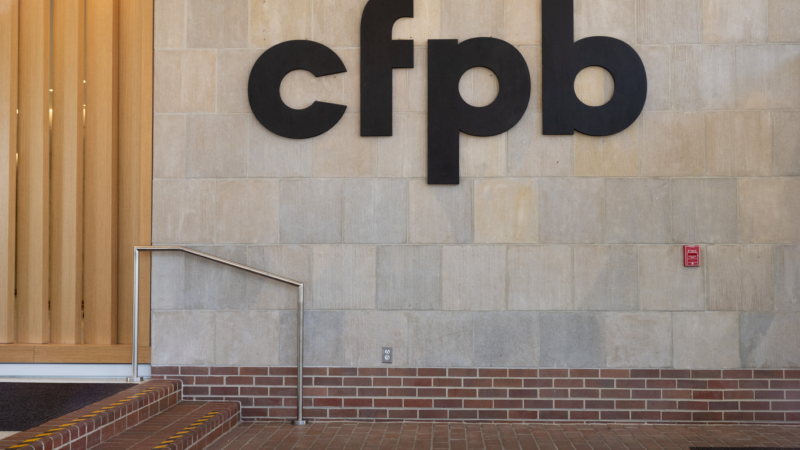New U.S. Postal Service head says he doesn’t believe in privatizing the mail agency
Trump administration talk of transforming the U.S. Postal Service has set off a flurry of concerns about the future of the federal mail agency.
The new leader of USPS is now trying to clear the air.
“I do not believe that the Postal Service should be privatized or that it should become an appropriated part of the federal government,” Postmaster General David Steiner said Thursday in his first video message to USPS employees. “I believe in the current structure of the Postal Service as a self-financing, independent entity of the executive branch.”
Steiner officially took over the country’s mail service Tuesday, about four months after Louis DeJoy stepped down as postmaster general.
A former CEO of Waste Management, Steiner also previously served on the board of FedEx. Asked by NPR how Steiner — who owned shares in FedEx at least as of September 2024, according to a Securities and Exchange Commission filing — is handling stocks that could present a financial conflict of interest, USPS spokesperson David Walton says in a statement that they “have been or will be resolved, sold, and/or divested as required by law.”
Still, Steiner’s background at a top shipping competitor to USPS raised privatization concerns among employee unions, which organized a series of rallies around the country to protest Trump officials’ calls to overhaul the country’s mail service.
For now at least, the new postmaster general’s effort in Thursday’s video to address what he called “rumors” has eased those worries for some union leaders.
“We are pleased that Postmaster General Steiner has privately, and now publicly, expressed his support for a strong public Postal Service,” says Brian Renfroe, president of the National Association of Letter Carriers, which represents carriers in cities, in a statement.
The National Rural Letter Carriers’ Association’s president, Don Maston, says: “The words are what we want to hear. The actions will speak for themselves.”
Maston adds that he hopes to see USPS continue trying to grow its shipping business under Steiner. “And if we see any indications that things are being shifted to UPS or we’re getting back in business with FedEx in a way that may not be something that we want to see, absolutely we’re going to have to take issue with that,” he notes.
Steiner’s video message to postal workers nodded to the controversial, 10-year “Delivering for America” reorganization plan that DeJoy introduced in 2021. Steiner said changes in recent years have brought USPS “substantially closer to private-sector logistics practices” and improved its competitiveness in terms of pricing and product strategies. Still, Steiner noted he thinks USPS “can improve” and plans to “assess and determine what modifications” to the USPS’ approach will “best serve the Postal Service, our employees and our customers.”
President Trump has expressed support for selling off the services of USPS to a private company, a kind of move that he has said was “not the worst idea” he’s ever heard. In 2018, his first administration released a proposal for “privatization through an initial public offering (IPO) or sale to another entity.” Trump has often pointed to the mail agency’s troubled finances, which have been saddled with declines in mailing and legal requirements to pre-fund health benefits for retired postal workers.
Privatizing, however, is likely to result in higher shipping prices for the public and reduced mail service to rural areas, industry analysts have warned. In a 2018 report, a task force on the U.S. postal system put together by the first Trump administration concluded that the “USPS’s comprehensive delivery network that covers every address in the country is a critical part of the nation’s infrastructure that cannot be replicated by private actors.”
There’s also bipartisan opposition to privatizing USPS in Congress.
This week, a 14th House Republican — Rep. Dan Newhouse of Washington — signed on to a resolution saying Congress should make sure the Postal Service stays an independent federal agency and not privatized. The resolution, which was introduced by Democratic Rep. Stephen Lynch of Massachusetts and is currently stuck in the House Oversight Committee, now has 218 sponsors. A Senate version of the resolution also has a bipartisan, but smaller, group of supporters.
The Postal Service generally receives no tax dollars to keep it running, relying instead on its stamp sales and other service fees.
To help stabilize its finances, USPS raised the price of a first-class “forever” stamp on Sunday by almost 7% to 78 cents, among other increases. While it is one of the world’s lowest prices for mailing a letter domestically, it also marks the seventh price hike by USPS in the past four years.
Editor’s note: USPS is a financial supporter of NPR.
Edited by Benjamin Swasey
Judge orders Trump administration to continue to seek funding for the CFPB
The order is the latest in a complex legal battle over the fate of the Consumer Financial Protection Bureau, a watchdog agency.
In a year of steep challenges, there were still shining moments in global health
The Trump administration's deep cuts in U.S. foreign health aid had a devastating impact. Yet there were achievements of note in spite of it all.
An escalation in Yemen threatens to reignite civil war and widen tensions in the Gulf
Saudi Arabia bombed Yemen's port city of Mukalla, targeting a shipment of weapons from the United Arab Emirates for separatist forces. The UAE later said it would withdraw its forces from Yemen.
Cecilia Giménez, the artist who ‘restored’ the face of Jesus, has died at 94
Giménez international attention after she attempted to restore an old fresco. While it was immediately ridiculed at the time, the piece eventually turned into a tourist attraction.
What being around death taught this hospital chaplain about life
J.S. Park helps patients and their families cope with death every day as a hospital chaplain. He explains what to expect as a person is dying, and how to reckon with uncomfortable feelings about death.
Israel says it will bar aid groups, including Doctors Without Borders, from Gaza
Israel accused Doctors Without Borders, one of the largest health organizations operating in Gaza, of failing to clarify the roles of some staff that Israel accused of cooperation with militants.








